Africa
As part of our news analysis slot on Africanews, we will be updating a media watch page that deals with major issues of media ongoings across the continent.
It will cut across happenings in mainstream and across social media with also a special eye for fake news.
June 21: Kenya to leverage on spike in tech use due to pandemic
Kenya’s Minister of Information and Communication Technology, Innovation and Youth Affairs, Joe Mucheru, says use of technology spiked because of the COVID-19 pandemic.
As a result, “we are working with the internet providers to ensure young people are protected,” the Minister told the press during Sunday’s coronavirus daily press briefing by the Health Ministry.
We are focusing on training those using technology. Our target is is to train over 5000 young people on how they can go online and get jobs to earn a living; we are working on ensuring cyber space is safe for everyone.
He thanked the media for their involvement in helping educate the public in that direction via educational content on TV and radio.
On the area of privacy he said: “Data protection law is already is place. We shall be employing a commissioner in two weeks time. Our goal is to protect people’s privacy.”
- Ethiopia restores internet to western Oromia after 3-month blackout
- South Africa impose jail term for COVID-19 fake news
- Facebook to help combat coronavirus fake news in Nigeria
- Kenya arrests coronavirus fake news peddler
- UNESCO bemoans misinformation amid coronavirus pandemic
- African governments battle coronavirus fake news
- Journalists in Uganda demand colleague’s freedom
- Media freedoms in Somalia
- US embassy calls out fake news over Nigeria pastor’s visa
- Nigeria army arrests journalist, Burundi jails journalists
- Ethiopia ombudsman decries info blackout
- AP racist photo, BBC’s Kobe – LeBron mix-up
- Internet outage in Togo
- Beninese radio station fires all employees after suspension
- Burundi arrest journalist over corruption report
- Ghana remembers slain anti-corruption investigator
- Cameraman assaulted in Nigeria
- Ethiopian journalists associational dreams
- Journalists detained in Uganda and Malawi
- Western Ethiopia internet cut, Sudan bans pro-Bashir press
Internet access restored to western Oromia in Ethiopia
Internet connectivity has been restored to a part of Ethiopia’s Oromia region which has been without connection for about three months.
In January this year, is a partial internet cut was imposed across several towns in western Ethiopia. President of the region confirmed early Tuesday that due to improvement in the security situation in the region, connection was to be restored. State-run FBC confirmed that connectivity had returned.
Activists, press and human rights groups had actively campaigned for government to restore internet access in the affected areas. The campaign got a fresh impetus with the coronavirus pandemic as campaigners insisted that people in the region risked not getting enough information of the public health crisis.
At the time of the blackout, government defended the move as necessary to curb rising insecurity in the area where the army was engaged in exchanges with a former rebel group. Over a dozen officials of the region have been killed in the last few months by suspected rebels in the area.
The BBC confirmed back in January that “in some areas mobile call services were also not working.” The state monopoly EthioTelecom stayed away from commenting on the situation.
The outfit twice last year cut the internet; first over national level examinations and in the wake of a foiled coup in the Amhara regional state.
#Ethiopia: Internet has been restored in west #Oromia zones pic.twitter.com/GxSxLFkdX9
— FBC (Fana Broadcasting Corporate S.C.) (@fanatelevision) March 31, 2020
South Africa enacts fake news regulation
The new regulations for the Disaster Management Act gazetted on Wednesday has stipulated those who spread fake news about the coronavirus can be fined or serve a six month prison sentence.
The regulations have also warned a similar sentence for someone who intentionally exposes someone to the disease.
The regulations, signed by Cooperative Governance and Traditional Affairs minister Nkosazana Dlamini-Zuma, concern all government departments and their responsibilities to curb the spread of Covid-19.
Credit: News24
Facebook to fact check coronavirus fake news in Nigeria
Facebook has said it is running a fact-checking pilot in Nigeria to help stop the spread of fake news about coronavirus.
The social media giant says it will use its messaging app – WhatsApp – to help researchers gather misinformation and respond with accurate information.
It will also provide banner adverts to the World Health Organization (WHO) and the Nigeria Centre for Disease Control (NCDC) to be used for coronavirus education campaigns on Facebook in Nigeria.
Fact-checking organisation AfricaCheck will be checking and debunking false claims made in local languages including Yoruba, Igbo and Hausa.
These are part of measures the tech giant has put in place with some African governments to help stop inaccurate stories doing the rounds on its platforms, which also includes Instagram.
Other measures include prohibiting advertisements for products that imply they can cure or prevent coronavirus infections and a temporary ban advertisements selling medical face masks.
Credit: BBC Africa LIVE page
Kenya arrest over coronavirus fake news
Kenya’s Directorate of Criminal Investigations announced on Sunday the arrest of a 23-year-old accused of peddling coronavirus related fake news.
“Elijah Muthui Kitonyo aged 23 years has been arrested in Mwingi for publishing misleading and alarming information on Corona virus. He will be charged for publishing false information that is calculated or results in panic contrary to section 23 of the Computer Misuse and Cyber Crimes Act of 2018.
“We urge members of the public to be responsible and to desist from authoring, publishing or sharing unconfirmed information that may cause panic and anxiety,” they posted on Twitter.
… commits an offence
and shall on conviction, be liable to a fine not exceeding
five million shillings or to imprisonment for a term not
exceeding ten years, or to both.
/4— DCI KENYA (@DCI_Kenya) March 15, 2020
Though his Twitter bio says he is an “aspiring blogger and influencer,” in a post published on March 13, the basis for his arrest, he claimed to be a staff of the national carrier, KQ, and belied a government account of a coronavirus patient, the country’s index case.
Africa,n governments have moved to charge nationals to desist from peddling false information which could create fear and panic and to further deteriorate actions aimed at controlling the spread of the pandemic. Kenya as at close of day Sunday (March 15) had three confirmed cases.
Busted! How fake news crowned Ugandan politician world’s ‘most arrested’
UNESCO bemoans misinformation amid coronavirus pandemic
The United Nations Education Scientific and Cultural organization, UNESCO, is cautioning against the spread of fake news amid the coronavirus outbreak.
Audrey Azoulay, UNESCO Director-General, posted a tweet stressing that fighting fake news in these times was a collective responsibility for all.
“#COVID19 fuels other viruses of fake news, mistrust and nationalism. In response, we can only count on scientific research, information and cooperation.”
“#COVID19 fuels other viruses of fake news, mistrust and nationalism. In response, we can only count on scientific research, information and cooperation.” –
— UNESCO (UNESCO) March 13, 2020AAzoulay#coronavirus #CoronavirusPandemic https://t.co/3iM3D3GcIR
CNN Africa’s coronavirus caption irks tweeps
CNN Africa is under fire for a caption that some Twitter users see as offensive relative to the coronavirus coverage on Africa.
“Cases of coronavirus in Africa have been few and far between but the numbers are rising rapidly as Nigeria and South Africa on Monday announced new cases and the first death is recorded in Egypt,” this caption to a story on how the virus was “gaining foothold” in Africa irked tweeps.
The article is an “everything you need to know about COVID-19 in Africa” article in which the authors are running updates on the epidemic.
What a shameful display of a sickening desire for Africa to be affected by # corona virus.
One new case in Nigeria and CNN reports a ‘rapid rise’ . Shame on you
— ZahrahMusa Ph.D (Zahrahmusa) March 10, 2020CNNhttps://t.co/KYxHWrfIvY
Dear
— Ifeanyi Nsofor (ekemma) March 10, 2020CNNAfrica, it is NOT right to say that Coronavirus cases are rising rapidly in Africa. According to this piece, a continent of 1.2 billion people has "reported nearly 100 cases". This is a case of misinformation. https://t.co/TEER3NmnuQ
They are now championing propagation of Alternative Facts. ???
— OluwaloMuyiwa (@Olumuyeewah) March 10, 2020
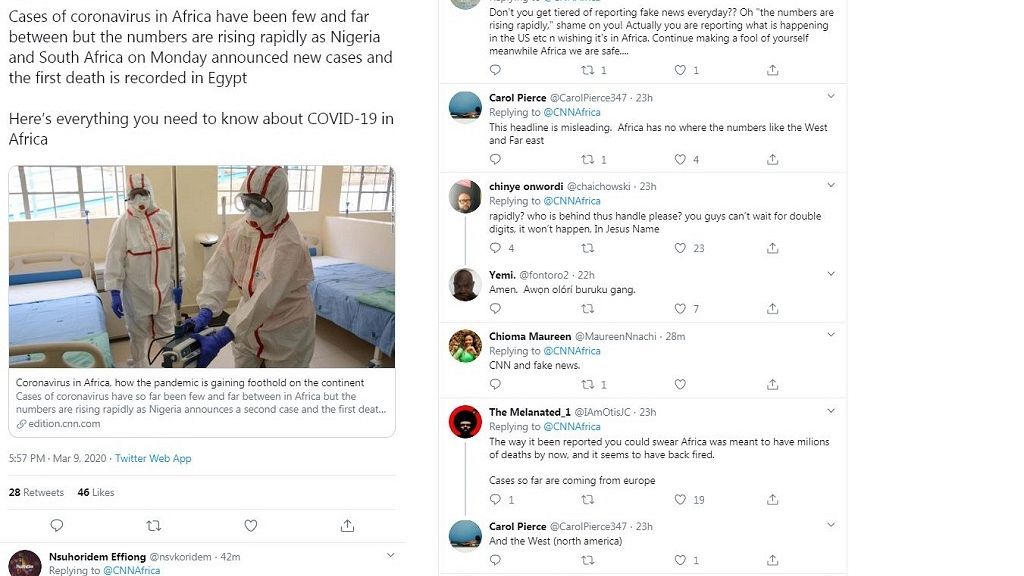
Combating coronavirus fake news
“I would like to applaud the capability of the National Institute of Communicable Diseases for having acted very quickly and swiftly informing the Minister who in turn informed me,” the words of South African president Cyril Ramaphosa.
The president added on Thursday that he ordered that the information be made public via parliament in order to avoid the possible spread of fake news.
“Government will demonstrate seriousness in terms of dealing with this matter and we will continue to be transparent, at the same time we want South Africans not to panic because we will continue to ensure that we handle this matter with the necessary care and capability that it requires,” he added.
Fake news has been a big deal in coronavirus coverage across Africa. Governments continue to provide timely information via official channels in order to combat the spread of fake news especially on social media.
Nigeria’s disease control outfit and the Lagos State health outfit in the aftermath of its index case extensively has continually provided information on suspected cases, tests and test outcomes.
South Africa was caught in a fake news report on Friday when multiple portals reported that soldiers meant to help evacuation of citizens from China had refused to board the “rescue aircraft.”
Kenya this week proposed a law that will criminalize the spread of fake news related to the disease. The authorities say they have enhanced monitoring of social media and other digital platforms to check the spread of misinformation about coronavirus.
Government spokesman Cyrus Oguna said detectives from the cybercrime unit are analysing content shared online for investigation, arrest and prosecution of those culpable.
Kenya’s Computer Misuse and Cybercrimes law, criminalises sharing of false, misleading or fictitious information and stipulates a fine of 5m Kenyan shillings ($50,000) or imprisonment for a term not exceeding two years or both.
Journalists in Uganda demand colleague’s freedom
The Foreign Correspondents Association of Uganda (FCAU) has called on authorities in the country to release their colleague Moses Bwayo, who was arrested while filming a documentary on opposition politician and musician Bobi Wine.
Bwayo has been charged with unlawful assembly and was on Wednesday remanded to the country’s maximum-security prison in the capital Kampala.
A charge sheets seen by Reuters accuses Bwayo and eight others of assembling unlawfully near a police barracks in Kampala and singing songs “subverting or promoting subversion of the government of Uganda.”
FCAU insists that authorities must not criminalise journalists for reporting on opposition political groups.
Bwayo’s lawyer Caleb Alaka says a bail application application for his client was denied.
“I applied for bail … but the magistrate decided to give a deaf ear to that and remanded him,” Alaka told Reuters.
Bwayo was first arrested on Feb. 24 as he filmed a documentary about Bobi Wine who has declared his intentions to unseat president Yoweri Museveni.
He was freed on police bond, but when he returned on Wednesday as instructed, Bwayo was taken to court, charged and remanded, Alaka said.
Museveni’s critics insist that cases like Bwayo’s are part of an escalating clampdown on independent media and the opposition ahead of next year’s presidential election. Government denies targeting opposition politicians or the media.
Liberia apologises for death of journalist
Liberia’s information minister Eugene Nagbe has apologised for the government’s failure to investigate the alleged beating of an investigative journalist.
The beating which reportedly took place at a stadium where he had gone to do the commentary for a football match, is thought to have led to Zenu Miller’s death 12 days ago.
Miller was a television show host who moderated discussions on national issues addressed by president George Weah’s government.
Nagbe who apologised to local journalists as he signed a condolence book in Miller’s memory, did not indicate whether government would still investigate the presidential security guards that assaulted the journalist three weeks ago.
Media freedoms in Somalia
Human rights group Amnesty International said on Thursday that journalists in Somalia are “under siege”, facing bombings, beatings, attacks and arrests.
The East African nation has long been seen as one of the riskiest places to work as a journalist, with the twin threats of reporting on conflict and draconian restrictions imposed by the authorities.
But now the situation is getting even worse, Amnesty said, in a report titled “We live in perpetual fear”, detailing what it called a “dramatic deterioration” in press freedom.
“A surge in violent attacks, threats, harassment and intimidation of media workers is entrenching Somalia as one of the most dangerous places in the world to be a journalist,” Amnesty said, calling on the government to take action.
Journalists face threats on all fronts, from attacks by Somalia’s Al-Qaeda-allied Al-Shabaab fighters, to the internationally backed authorities.
However, Somalia’s government rejected the report, calling it a “fabrication” and “ludicrous allegations”, and accusing journalists who had fled the country of making up stories to secure asylum abroad.
“We find no concrete evidence worthy of accusing the Federal Government of Somalia of abuses against journalists,” the Ministry of Information said in a statement.
At least eight journalists have been killed since 2017, and at least eight more fled the country fearing for their lives, the report said.
“From barely surviving explosive-wired cars, being shot, beaten up and arbitrarily arrested, journalists are working in horrifying conditions,” said Deprose Muchena, Amnesty’s head for eastern and southern Africa.
“This crackdown on the right to freedom of expression and media freedom is happening with impunity. The authorities hardly investigate or prosecute perpetrators of attacks on journalists,” Muchena said.
Reporters Without Borders ranks Somalia 164th out of 180 countries on its global list of press freedom, with more than 43 journalists killed over the past decade.
AFP
US embassy busts visa refusal fake news
The United States embassy in Nigeria on Friday called out a spreading report that it had denied visa to one of Nigeria’s most followed pastors.
Multiple portals said David Oyedepo had been denied visa, a situation that led to a fracas at the embassy. The report according to the embassy was fake.
David Oyedepo is the founder and presiding Bishop of the megachurch Faith Tabernacle in Ota, Ogun State, southwestern Nigeria, and Living Faith Church Worldwide, also known as Winners’ Chapel International.
Aside his work as a member of the clergy, he is author and businessman. As at 2011, Forbes said his net worth was at $150 million.
#FalseNews Alert! Be advised, the reports making the rounds about a visa being denied to Nigerian Bishop Oyedepo are false.
If you have seen this manufactured item in the media, help defeat this #misinformation by communicating to everyone that it is completely false. pic.twitter.com/H1pDwhf9XW— U.S. Mission Nigeria (@USEmbassyAbuja) January 31, 2020
Nigeria army arrests journalist, Burundi jails quartet
A tough day for journalists on January 30 as Burundi jailed four journalists over charges of undermining state security. After a three-month trial the privately owned Iwacu outlet said its journalists had been jailed two-and-half years each.
A lawyer representing them said, they will appeal the decision. They have 30 days to launch the appeal. The move has been slammed by press rights groups as a dark day for journalism in the country.
In Nigeria, Amnesty’s local branch reported that soldiers had arrested a journalist working with the Daily Trust newspaper in Borno State capital Maiduguri.
“This shocking pattern of harassing journalists is unacceptable. Nigeria has an obligation to respect & protect the right to freedom of expression,” Amnesty Nigeria added.
The Daily Trust said the arrest was connected to a story on military operations in the North East of the country; it said they had since been released. It is not the first time the army is rounding up journalists over stories of this kind.
Amnesty International condemns arrest of journalist Olatunji Omirin of
daily_trustby HQNigerianArmy today in Maiduguri. This shocking pattern of harassing journalists is unacceptable. Nigeria has an obligation to respect & protect the right to freedom of expression.— Amnesty Int. Nigeria (@AmnestyNigeria) January 30, 2020
Ethiopia ombudsman decries info blackout
Ethiopian Institute of Ombudsman, a state-mandated body, says government offices are refusing to furnish journalists with information and by that restricting access to information.
Its latest report cited among others, the Tigray regional government’s Communication Office, the Dembi Dollo University and Addis Ababa Housing Agency as main culprits.
The case of the university is believed to be connected with a student abduction crisis that has birthed protests in parts of the country demanding the Amhara region and federal governments to come clean on what has become known as #BringBackOurStudents campaign.
How racist AP photo ‘helped’ Ugandan activist, BBC’s footage blip
A young Ugandan climate activist Vanessa Nakate used Twitter to call out American news outlet AP after she was deliberately cropped out of a photo ostensibly being the only person of colour.
She was part of activists during last week’s World Economic Forum in Davos, Switzerland. She received lots of solidarity from the platform. The AP issued an official apology over the incident. Nakate’s Twitter account has since been verified.
Solidarity for Ugandan climate activist over racist AP photo crop https://t.co/fIzjPi8W5h
— africanews (@africanews) January 25, 2020
Meanwhile, the BBC was caught in a tight corner during coverage of the death of American basketball star, Kobe Bryant, who was killed along with others in a helicopter mishap on Saturday, January 25.
The BBC rolled footage of LeBron James whiles reporting Bryant’s death. Social media as usual reacted furiously following which a rectification was effected and an apology issued for what BBC said was a “human error” that fell below their “usual standards.”
Africans have been divided on the subject of reactions to Kobe’s death, whiles the larger majority sent condolence messages and shared positive Bryant content, others said Africans should focus on sympathizing when Africans are adversely affected.
⚡️ “African tributes to death of NBA star Kobe Bryant” ????#KobeBraynt https://t.co/jigUHWZZ3x
— africanews (@africanews) January 27, 2020
Cannot believe the BBC- reporting on Kobe Bryant’s death but showing video footage of LeBron James.
If you know you know. pic.twitter.com/oZNmqA1rqF
— Samira Sawlani (@samirasawlani) January 26, 2020
Togo internet outage after technical fault
Togolese were without internet from Wednesday after connectivity dropped across the West African country, internet rights group, NetBlocks reported.
Most people reacting to the development on Twitter drew political meanings into the outage alleging that the government was “testing the waters” ahead of presidential polls in February.
But another internet rights group, Paradigm Initiative, quoted the state-run Togo Telcom as saying the issue was a technical one which arose from a fault with submarine cables in Spain and Portugal.
⚡️ “Internet outage in Togo has Twitter buzzing despite official reasons”
????️?
- Outage started January 22
- Situation was confirmed bynetblocks
- Net rights body, ParadigmHQ reports operator says its a technical issue
- Twitter 'reads' politicshttps://t.co/bL4ZQh8Pqh— Alfa Shaban (@AlfaAfrican) January 23, 2020
Radio station fires all employees after suspension
Beninese private radio station Soleil FM, owned by politician and business mogul Sebastian Adjavon, has fired all 41 employees in the wake of a government suspension of their operations.
“We are in cessation of activities since the radio is suspended until further notice by the High Authority for Audiovisual and Communication, the HAAC,” Virgile Ahouansè, a journalist and leader of the staff union told AFP. He said the dismissal letter was delivered on Tuesday.
He deplored the suspension stressing that: “the body invested by the constitution to protect press freedom has come to such a radical solution that does not take into account the right to information of Beninese.”
In mid-December, the radio, one of the few in opposition in Benin, received a letter from the president of the HAAC ordering “suspend programs until further notice”. Saturnin Djossou, its chief editor confirmed that the station had unsuccessfully applied for a renewal of their license prior to the suspension.
Burundi journalist arrested over corruption report
A Burundian journalist has been arrested after filing a report on misuse of public funds in the country.
Blaise Pascal Kararumiye who works with Radio Isanganiro was arrested on Thursday, his employer confirmed to the BBC.
The authorities have not disclosed the charges against the journalist and he was interrogated without a lawyer, station director Sylvere Ntakarutimana added.
Ghana remembers slain anti-corruption investigator a year on
Ahmed Hussein Suale was an unknown name and face in Ghana until his assassination in January 2019. That one incident became the biggest blot on Ghana’s mediascape in the year under review.
Ahmed was a key investigator with undercover journalist Anas Aremeyaw Anas. Reports linked his death to a production that unraveled corruption across Ghana football. A loudmoth lawmaker was cited prominently as inciting violence against Ahmed, whose photos he showed on primetime TV.
Anas posted a homage on the slain investigator on his social media handles. Meanwhile, the push for justice in the matter of his death continues in Ghana. The West African country has routinely been classed as the freeest space for journalists operating on the continent.
You were killed in the pursuit of truth.
We will never forget.
We will fight till justice prevails.#Justice4Ahmed #JournalismIsNotACrime #SayNoToCorruption pic.twitter.com/ygh1VDTSoF— Anas Aremeyaw Anas (@anasglobal) January 16, 2020
Ethiopian journalists move to form association
From a top jailer of journalists only a few years ago, April 2018 marked a turning point in Ethiopia after Prime Minister Abiy freed all detained journalists. The media scape has been crucial in driving Abiy’s reforms despite threats of hate speech and fake news.
Journalists in the country have now moved towards the formation of a professional association as pertains across much of Africa and the world. This is not the first time post-2018 that the idea has been raised.
In its 2019 report, Reporters Without Borders, wrote that media freedoms were being eroded following some incidents in 2019. The RSF report said a journalist was being detained in the line of work contrary to claims by Abiy that no journalist was behind bars during his Nobel Prize ceremony in December 2019.
የኢትዮጵያ ገለልተኛ ጋዜጠኞች ማህበር ዛሬ መስራች ጉባኤውን አካሂዷል።
More than 400 journalists mobilized ourselves within few days. This professional association is going to be the real deal. Salute to those who started the initiative. #Ethiopia pic.twitter.com/DJvs5lLC4x
— Haimanot B. Ashenafi (@Haimanotwua) January 12, 2020
A private TV station in Nigeria, Channels TV, reported last weekend that its cameraman and another were briefly detained by police and their tools assaulted. They were covering a protest in the central Benue State.
They were shortly released and all their materials returned. But on social media most people rather took to mocking the stations choice of words in reporting the incident.
Channels said its cameraman was assaulted by police but people advised that they use “clashes with police” as they have done when other classes of people happen to get involved with the police. Most of the retaliatory reactions were posted under their tweet.
Uganda journalists briefly arrested
The Daily Monitor portal in Uganda reported the brief arrest of two journalists who were picked up whiles covering the banned political consultations by musician, lawmaker Bobi Wine.
Bobi Wine was twice blocked this week by police when he tried to undertake political engagements. His People Power Movement had planned nationwide consultations towards his presidential ambitions. police arrested Wine, collaborators and some journalists.
They claimed our first consultation was blocked because it was an open venue. We secured an enclosed one. They lied we didn't have owner's permission. We produced evidence of payment. They have now intercepted us. Journalists arrested. People being clobbered. Dictator in panic pic.twitter.com/T87hwbhVeI
— BOBI WINE (@HEBobiwine) January 8, 2020
Malawi journalists arrested covering EU event
The private Nation newspaper in Malawi reported the arrest of journalists on Wednesday December 8 as they went to the main airport to receive n European Union delegation for post-election duties.
The Nation’s journalist Golden Matonga, ZBS journalist Steve Zimba and his television camera person Francis Chamasowa were released after being charged with “Disordery at an airport contrary to Aviation Act”.
The trio, who had their cell-phones and cameras confiscated by police were arrested at around 4pm, the time the EU delegation was scheduled to arrive. They were released on police bail around 6.30pm. #NationOnline
— NationOnline (@NationOnlineMw) January 8, 2020
Jan. 6 – 8: Security-related internet cut in Western Oromia
Reports indicate that there is a partial internet cut across several towns in western Ethiopia. The development has been in place since Monday.
The move is believed to be in connection with rising insecurity in western Oromia regional state where the army continues to battle a former rebel group. Over a dozen officials of the region have been killed in the last few months by suspected rebels in the area.
The BBC adds that “in some areas mobile call services are also not working.” The state monopoly EthioTelecom has yet to comment publicly on the situation. The outfit twice last year cut the internet; first over national level examinations and in the wake of a foiled coup in the Amhara regional state.
Jan. 7: Sudan bans pro-Bashir media outlets
In Sudan, the state continues to squeeze media outlets affiliated with ousted president Omar Al-Bashir. Two two newspapers and two television were affected by the measure.
Al-Sudani and Al-Ray Al-Am newspapers and Ashrooq and Teeba television stations were banned for allegedly receiving funding from al-Bashir, AFP news agency has reported. The punishment was meted down by a committee tasked with dismantling institutions linked to the former leader.
But editor-in-chief for the Al Sudani, Diaa al-Din Belal rejected the allegations in an interview with AFP: “We operate under a private company and we did not receive any funds from a party or a government authority,” Belal said. Bashir was deposed by the army amid protests in April 2019.
He has been jailed in a corruption case whiles other cases are running in the courts. Sudan is currently under a military – civilian council overseeing a transition to democracy.



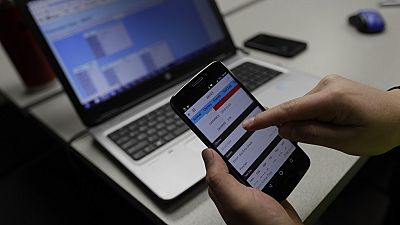

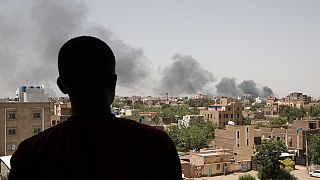
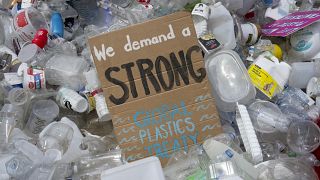

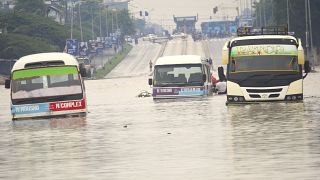
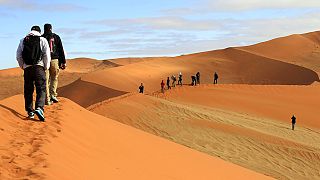
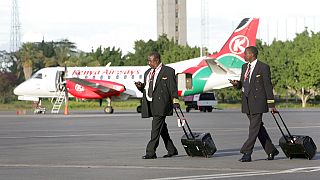
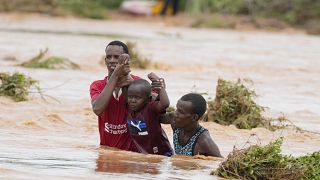
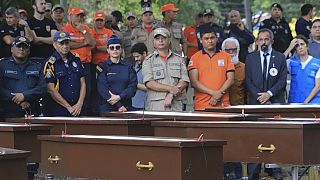
Go to video
Burkina Faso Suspends BBC and Voice of America
01:15
Africa: About 51 million lives saved through immunization programme - WHO
Go to video
Tunisian journalist sentenced to 6 months in prison for insulting an official
01:30
UN reports widening global inequality in sexual and reproductive health and rights
01:11
UK man runs the length of Africa in 10,000 miles and 352 days
00:59
British man running length of Africa nears finish line